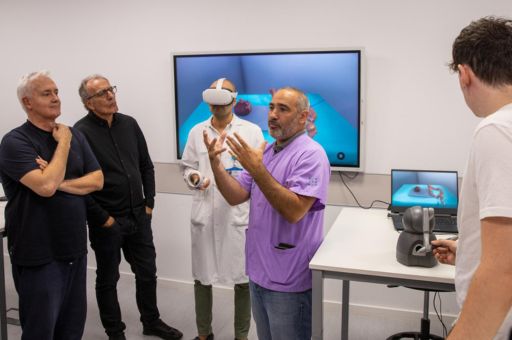With this innovation, medical professionals will be able to train using real digital models, feeling tissue resistance and anatomical textures as if it were a real procedure.
The Health Living Lab at the Son Espases University Hospital and the ADEMA University School have launched a pioneering international tech project that marks a milestone in medical-surgical training. It consists of a haptic (tactile) simulation system applied to virtual training for colorectal cancer treatment, with future applications expected in real surgeries across various surgical specialities.
Colon cancer is one of the most prevalent and deadly types of cancer in the Balearic Islands. Its incidence has been steadily increasing over recent decades, and it ranks as the second most common cancer in both men and women in the region. It is rare before age 5,0, but becomes more frequent around age 60. This cancer stems from abnormal and uncontrolled cell growth in the colon or rectum of the large intestine and often remains asymptomatic until it is significantly advanced.
TDB keeps you informed. Follow us on: Facebook, Twitter and Instagram
Son Espases and ADEMA Join Forces to Develop a Groundbreaking International 3D Tactile Simulator
Dr. Leandro Broggi, coordinator of the Simulation Centre and 3D Unit at Son Espases, explained:
“This technology will greatly enhance surgical planning, as we will not only see the organs—we will be able to feel them. Until now, all programs showed standard images, like a video game; this system uses the actual patient’s organ with their specific anatomy. This completely transforms how we prepare for surgery.”
According to Diego González, president of ADEMA, this technology enables the recreation of tactile sensations during virtual medical procedures, allowing professionals not only to visualize and plan a surgery or examination but also to “feel” in real time the resistance, texture, and consistency of the tissues they will manipulate inside the human body.
He emphasised that this project aligns with ADEMA’s commitment to research in support of its new degrees in Medicine, Biomedical and Health Engineering, and Biomedicine, which are being developed at its new Coll d’en Rabassa Campus.
The first clinical application of the system, once regulated and validated for training, will be in colorectal laparoscopic surgery, a key procedure in treating this type of digestive cancer. From now on, surgeries can be practised with high realism, improving therapeutic precision and patient safety. Plans are already in place to expand the system to other medical specialities.
The joint goal of both institutions is to create a versatile and patient-personalised simulation system, applicable in various fields of medicine and surgery, especially for procedures that demand high precision and tactile training.
This development represents a qualitative leap in clinical-surgical education and is expected to reduce complications during real interventions, particularly in complex tumour resections.
Haptic Simulation: The Future of Medical Learning
Haptic simulation combines specialised software and mechanical devices that provide tactile feedback, allowing users to feel the physical conditions of a clinical procedure, as though performing it directly on a patient. Already applied by ADEMA in dentistry, this technology is now being adapted to other specialities and procedures, including:
- Laparoscopic surgery
- Interventional radiology
- Spinal surgery
- Traumatology
- Ophthalmology
- Otorhinolaryngology
Cristina Granados, Managing Director of Son Espases University Hospital, highlighted:
“This collaboration reflects our strong commitment to technological innovation as a driving force for healthcare improvement. We promote tools that not only revolutionize medical education but also have a direct impact on patient safety and well-being.”
Diego González, ADEMA’s president, added:
“Thanks to an innovative proprietary software developed by ADEMA’s technical team and a high-precision haptic hardware, professionals can work on digital twins built from the patient’s real medical data. This allows for safe, controlled, and realistic surgery planning and practice before entering the operating room.”
Training with Digital Twins: Safety and Precision
One of the greatest benefits of this system is the ability to carry out preclinical training on exact 3D reconstructions of the human body, generated from the patient’s actual scans. This virtual environment allows anticipation of each patient’s specific anatomy, identification of anatomical risks, and high-detail training previously only possible in live surgeries.
Unlike other simulation tools, haptic technology enables the perception of bone density, tissue textures, and tumour consistency. This sensory component transforms learning, enabling students and professionals to develop much finer skills and gain confidence before facing a real clinical case.
Strategic Collaboration with Global Impact
The project is being developed at the Health Living Lab, led by Luis Alegre and directed by Dr. Leandro Augusto Broggi Fortti, head of the Simulation Centre and 3D Unit at Son Espases. Co-developers include Dr. Álvaro García Granero, a general surgeon specialised in coloproctology, and Marc Ferrà Canet, head of the 3D Unit and research group at ADEMA. The team also includes software specialist Óscar González, doctors Pere Riutord and Carlos López, and engineer Mauricio Sáenz-Laguna.
Technical meetings are underway to design the first haptic simulator for colorectal laparoscopic surgery, with phases already defined for future applications in other specialities. The long-term goal is a versatile simulation system applicable to various medical and surgical fields that require precise, tactile-based learning.
Excellence in Training and Commitment to Public Health
Beyond its technological dimension, this project carries a strong educational and social impact. Practising medicine using high-fidelity haptic simulators will allow better-trained professionals, fewer complications in real procedures, and most importantly, greater patient safety.
In the case of laparoscopic surgery, this technology is expected to facilitate less invasive and more effective treatments for digestive diseases, especially colorectal cancer, one of the most prevalent conditions among the Spanish population.
Already recognised as a reference centre for advanced haptic simulation, the ADEMA University School is now positioned at the international forefront with this proprietary technology, uniquely applicable across multiple medical and surgical specialities. Its collaboration with Son Espases, the leading university hospital in the Balearic Islands, demonstrates the powerful synergy between academic, clinical, and technological sectors.
